Introduction
Social media has become an integral part of our daily lives, and it’s no secret that it can be a powerful tool for businesses and individuals to connect with their target audience.
However, using social media for personal or business purposes requires a certain level of expertise, and there are many common mistakes that can be made along the way.
These 15 deadly social media mistakes can have a significant impact on your brand or personal image, and it’s crucial to be aware of them to avoid any negative consequences.
From posting insensitive content to neglecting your audience, these mistakes can damage your reputation and hinder your social media success.
In this article, we will explore each of these mistakes in detail and provide actionable tips on how to avoid them.
15 Deadly social media mistakes
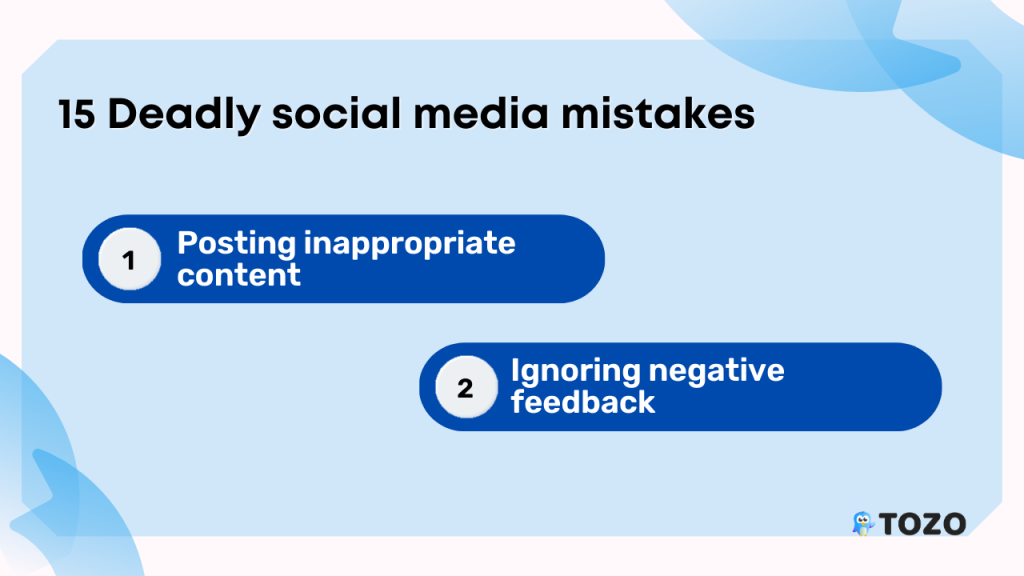
1. Posting inappropriate content:
Posting inappropriate content can cause a lot of harm to your brand or personal reputation.
Before posting anything, ask yourself if it aligns with your values, if it can offend anyone, and if it can hurt your credibility.
Remember, once you post something online, it can be hard to take it back.
2. Ignoring negative feedback:
Negative feedback can be tough to handle, but ignoring it can be even worse.
Instead, address negative comments promptly and professionally.
This will show your audience that you care about their feedback and are committed to improving your products or services.
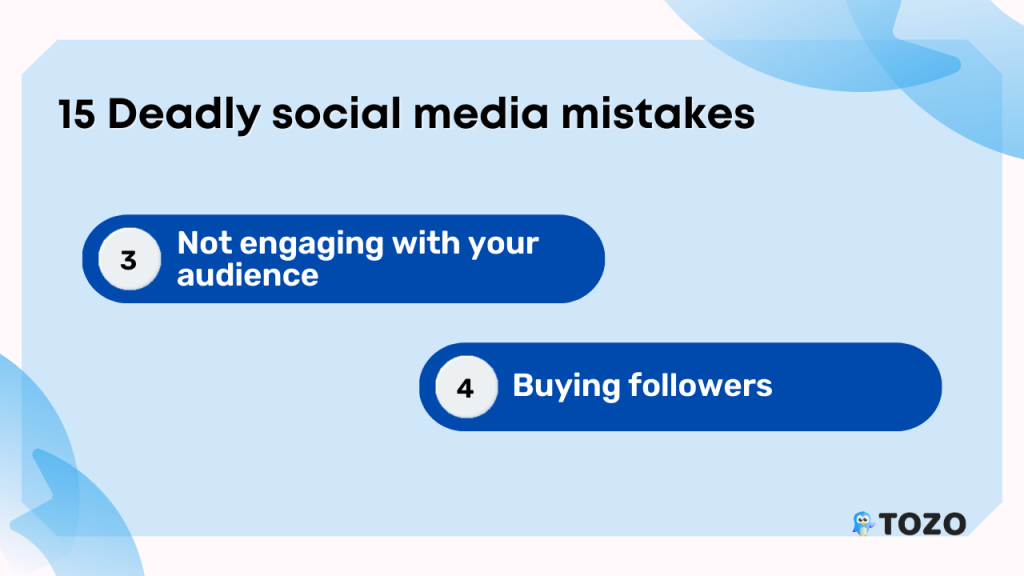
3. Not engaging with your audience:
Developing a devoted following requires engagement.
Make sure you’re responding to comments and messages, asking for feedback, and sharing user-generated content.
This will show your audience that you value their engagement and are committed to building a relationship with them.
4. Buying followers:
Buying fans might seem like an easy way to get more people to follow you, but it’s not a good long-term plan.
It can also harm your credibility if your followers are fake or low-quality.
Focus on creating valuable content and engaging with your existing followers to grow your audience organically.
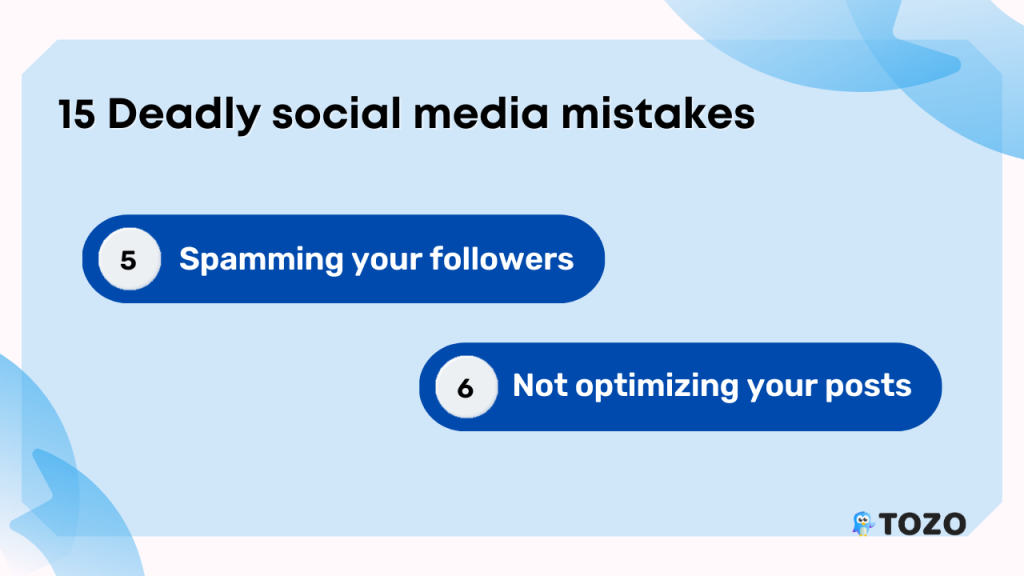
5. Spamming your followers:
Posting too frequently or bombarding your followers with promotional content can be annoying and turn them away from your brand.
Instead, aim for quality over quantity and focus on posting valuable content that resonates with your audience.
6. Not optimizing your posts:
Each social media platform has its own best practices when it comes to post formatting and optimization.
Make sure you’re using the appropriate hashtags, tags, and keywords for each platform to increase visibility and engagement.
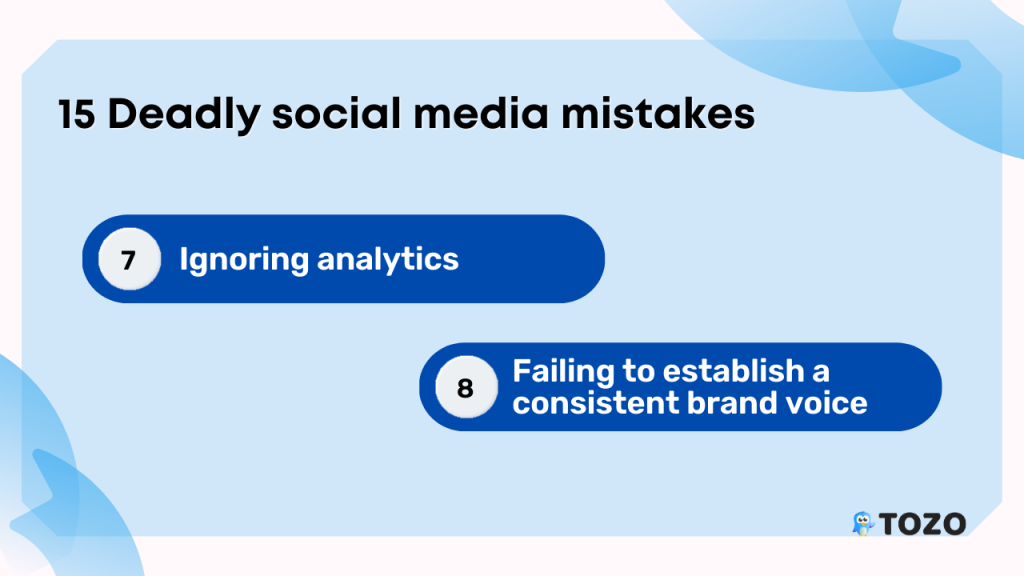
7. Ignoring analytics:
Analytics are a powerful tool for tracking your social media performance and understanding what content resonates with your audience.
Make sure you’re regularly checking your analytics and using the data to adjust your strategy accordingly.
8. Failing to establish a consistent brand voice:
Developing a consistent brand voice can help you build trust with your audience and make your content more recognizable.
Make sure your brand voice reflects your values and resonates with your target audience.
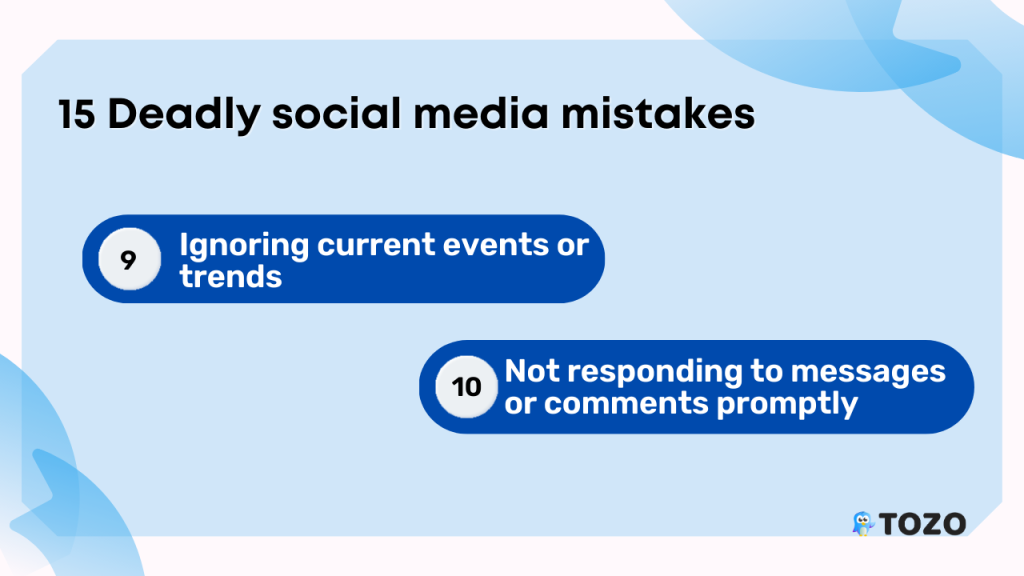
9. Ignoring current events or trends:
Staying up-to-date with current events and trends can help keep your content relevant and engaging.
Make sure you’re incorporating timely topics into your social media strategy when appropriate.
10. Not responding to messages or comments promptly:
Responding promptly to messages and comments shows your audience that you value their engagement and are committed to building a relationship with them.
Make sure you’re regularly checking your messages and responding promptly.
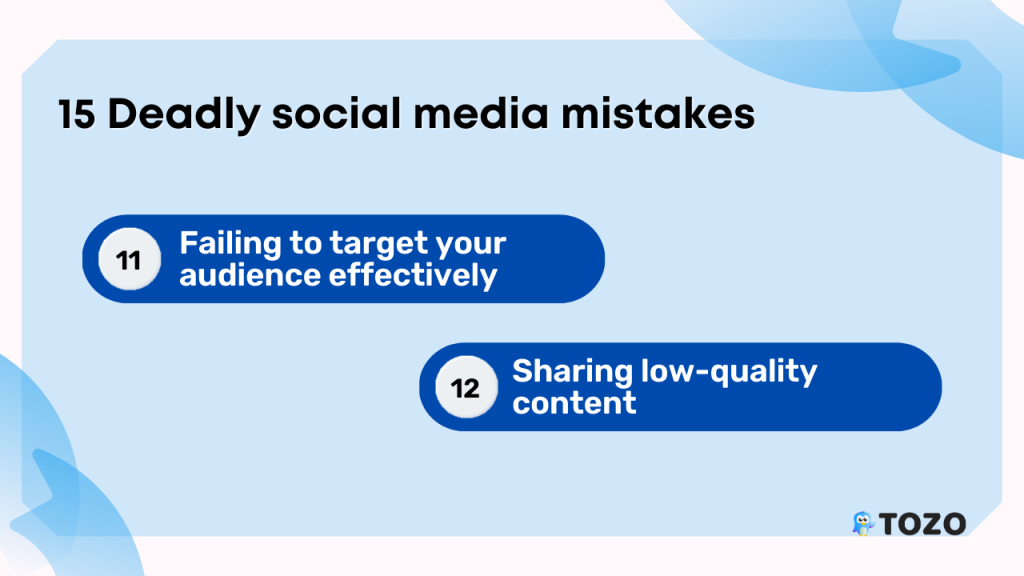
11. Failing to target your audience effectively:
Knowing your target audience is key to developing a social media strategy that resonates with them.
Make sure you’re tailoring your content and messaging to your target audience.
12. Sharing low-quality content:
Posting low-quality content can damage your credibility and turn your audience away from your brand.
Make sure you’re investing time and resources into creating high-quality content that resonates with your audience.
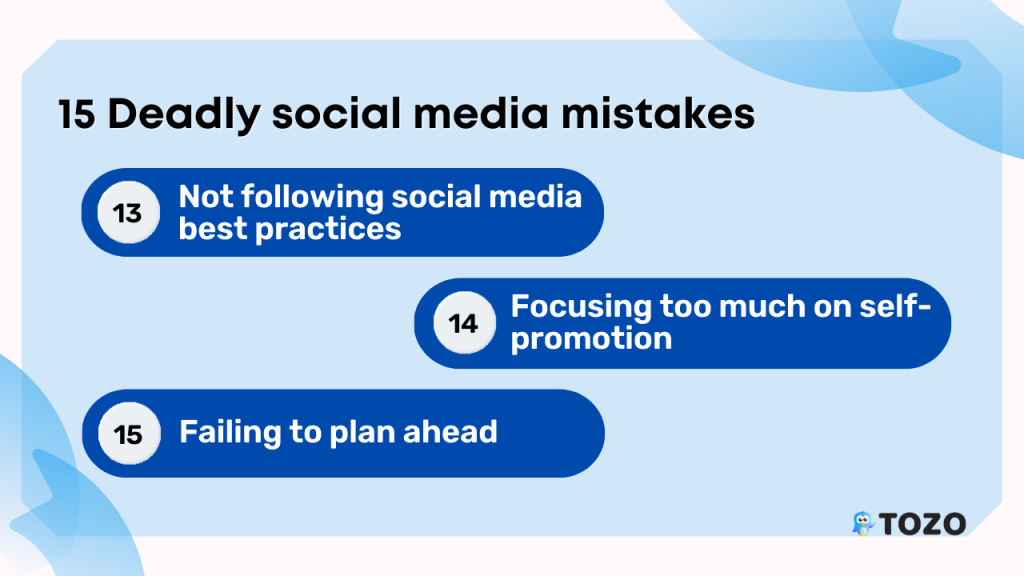
13. Not following social media best practices:
Not following social media best practices is a common mistake that can harm your social media strategy.
Social media platforms are constantly updating their algorithms, rules, and guidelines.
By not keeping up with the changes, you may inadvertently violate a platform’s terms of service, which can result in your account being suspended or even permanently banned.
14. Focusing too much on self-promotion:
While promoting your products or services is important, make sure you’re also sharing valuable information and engaging with your audience.
This will help you get people to trust you and stick with you.
15. Failing to plan ahead:
Developing a social media content calendar can help you plan your posts in advance and ensure you’re consistently posting high-quality content that resonates with your audience.
It can also help you stay organized and save time in the long run.
7 tips how to avoid social media mistakes
1. Develop a Clear Strategy:
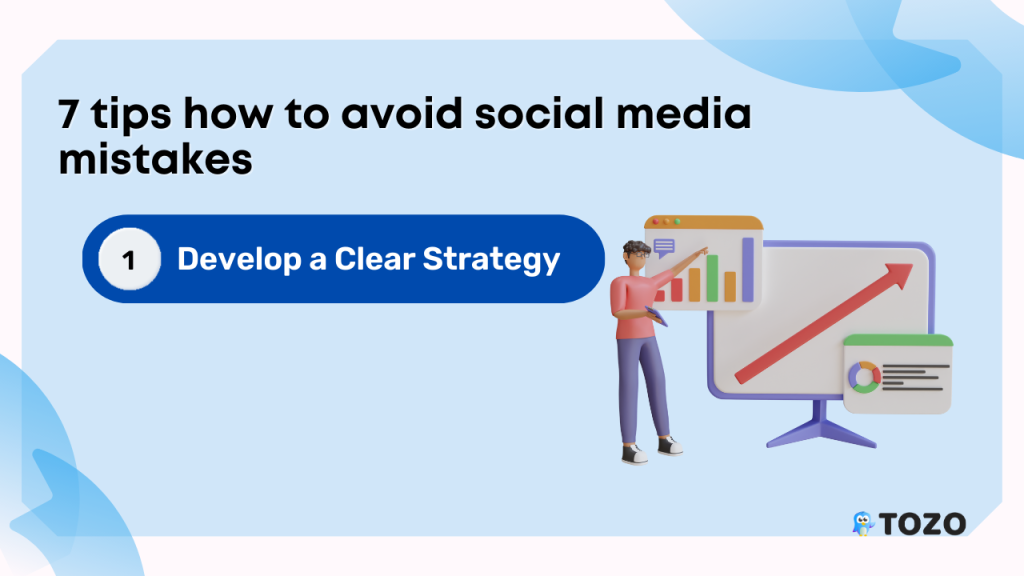
One of the most significant social media mistakes is not having a clear strategy.
Before you start posting on social media, you need to define your goals and objectives.
What do you expect social media will facilitate for you? Do you want more people to visit your website, more people to know about your brand, or more leads?
Once you have your goals in mind, you need to identify your target audience and create a message that resonates with them.
Develop a content calendar that outlines your posting schedule and the type of content you will share.
Having a clear strategy will help you stay on track and ensure that your social media efforts align with your overall marketing objectives.
2. Proofread Your Content:
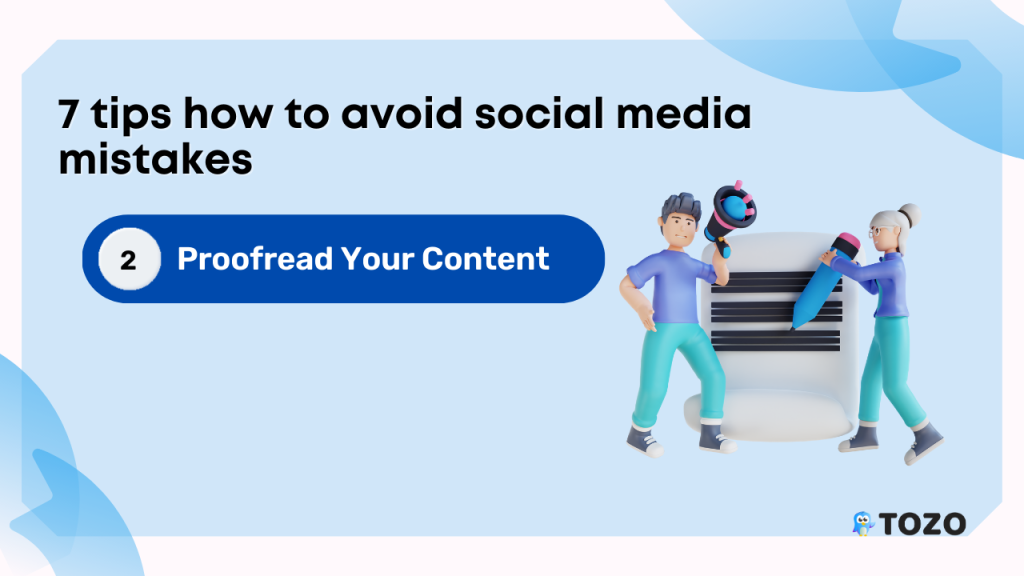
Typos, grammatical errors, and misinformation can undermine your credibility and damage your brand’s reputation.
Before publishing a post on social media, always proofread it. Use tools like Grammarly or Hemingway to catch any errors you may have missed.
You can also use a second set of eyes by having someone else review your content.
It’s always helpful to get feedback from someone outside of your organization to ensure that your message is clear and easy to understand.
3. Monitor Your Accounts:
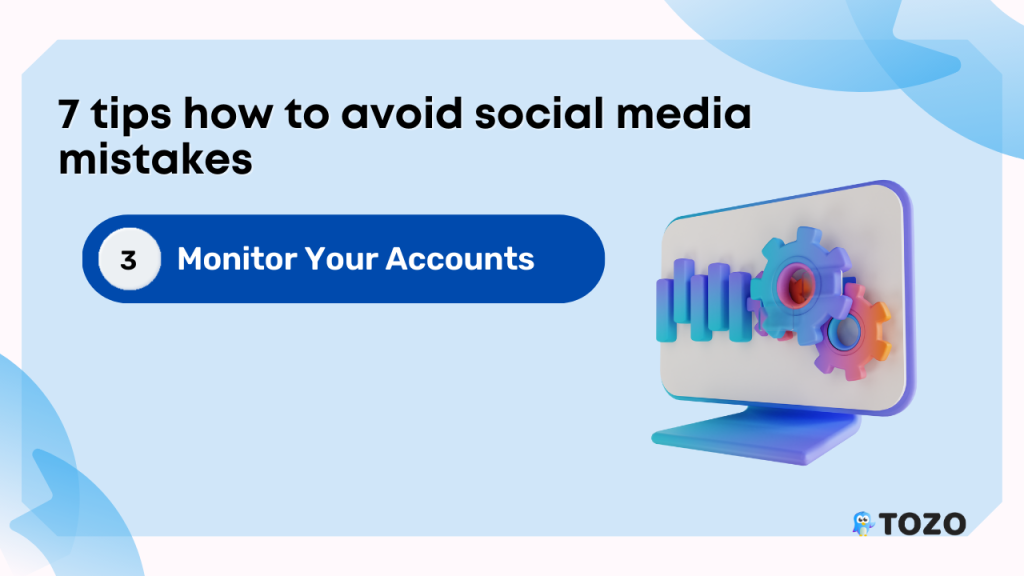
Social media is a two-way conversation.
If someone leaves a comment or sends you a message, make sure to respond promptly and appropriately.
Show your audience that you value their opinions by engaging with them.
Tozo.social is a useful tool that can help you monitor your social media accounts effectively.
With this tool, you can track your mentions, comments, and messages across multiple social media platforms in one place.
Tozo.social provides real-time notifications when someone mentions your brand, allowing you to respond promptly and appropriately.
The tool also includes sentiment analysis, which can help you identify any negative comments or reviews.
4. Use Visuals Effectively:
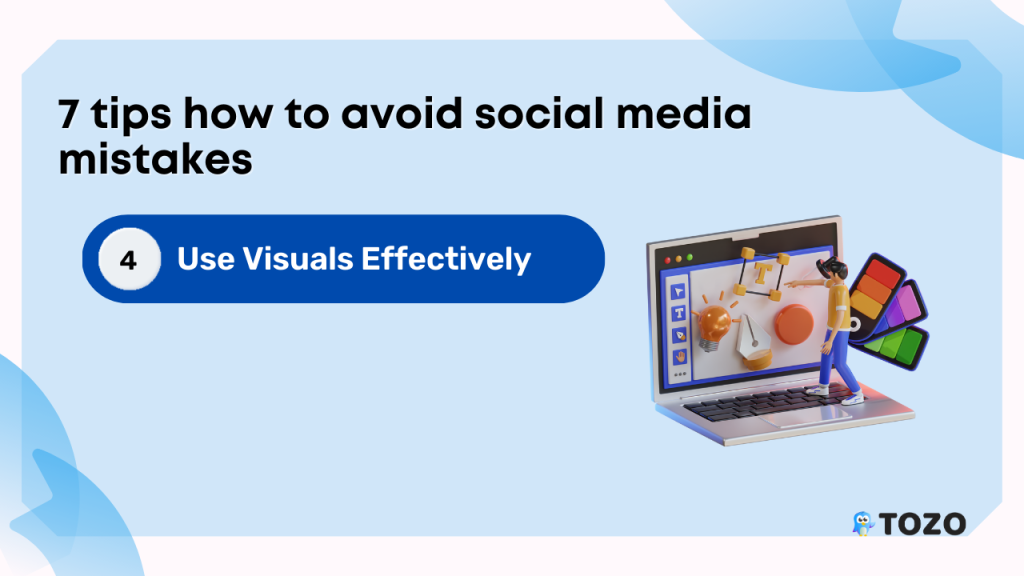
Visuals are important for social media.
Including high-quality images, videos, and graphics can help your posts stand out and increase engagement.
However, using visuals for the sake of using them can backfire.
Make sure that your visuals are relevant to your message and audience.
Use images and videos that are high-quality and on-brand.
Avoid using stock photos that don’t align with your brand’s personality or tone.
5. Know Your Audience:
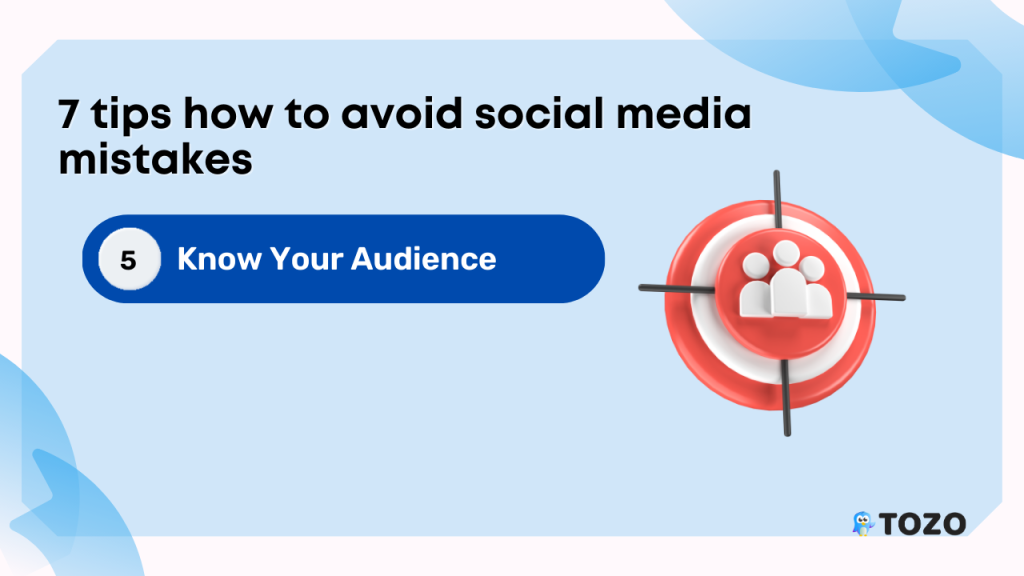
To create content that appeals to your target audience, it is essential to understand them.
Conduct research to identify your audience’s interests, preferences, and behaviors.
Use this knowledge to make content that meets their needs directly.
Consider the platforms that your audience uses and the time of day they are most active.
This information can help you determine the best time to post and the type of content that performs best on each platform.
6. Avoid Controversial Topics:
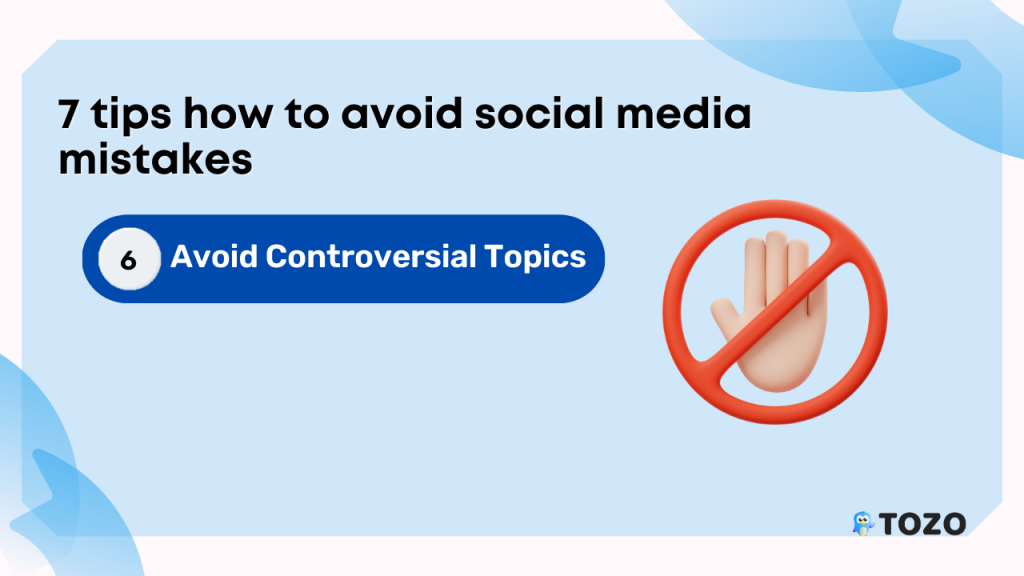
Steer clear of divisive and sensitive topics that could alienate your audience or damage your brand’s reputation.
Politics, religion, and social issues can be polarizing and should be approached with caution.
Unless your brand is explicitly tied to a specific issue, it’s best to avoid these topics altogether.
7. Use Social Media Analytics:
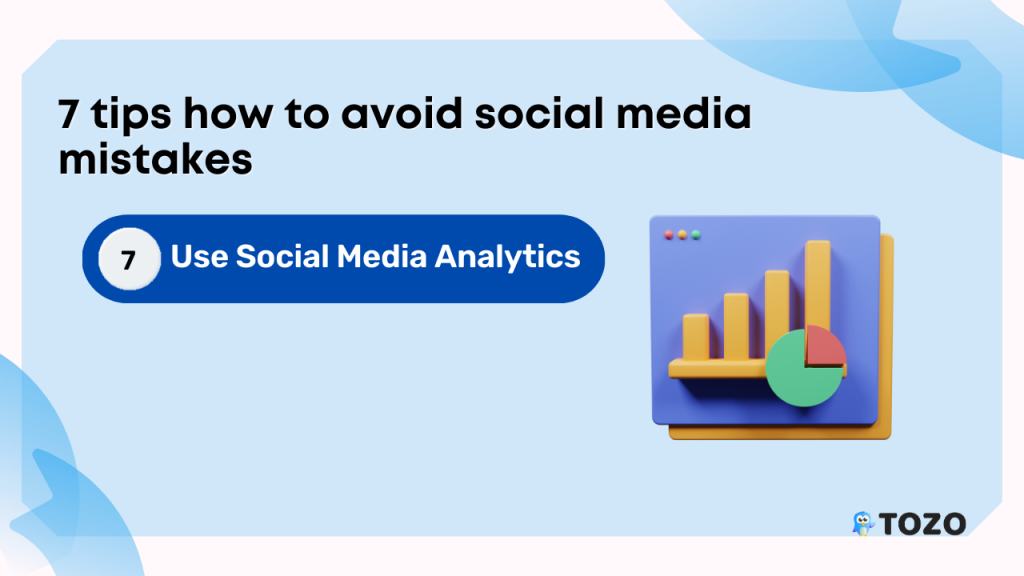
Social media analytics provide valuable insights into your social media performance.
Use analytics tools to track your reach, engagement, and audience demographics.
Analyzing your data can help you identify trends, opportunities, and areas for improvement.
Conclusion
Social media can be a valuable asset for businesses to reach and connect with their audience.
However, it’s crucial to be aware of common social media mistakes that can negatively impact your brand’s image.
By following the tips we’ve outlined in this article, such as having a clear strategy, monitoring your accounts, you can avoid these mistakes and ensure that your social media efforts are effective.
Remember, social media is a powerful tool for engaging with your audience and building your brand, so use it wisely and always prioritize your audience’s needs and preferences.



